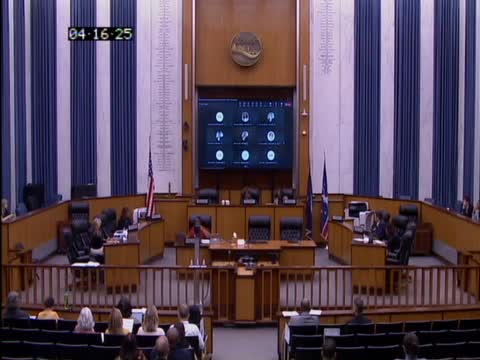Committee forwards proposed $1.16 tax rate and discusses assessment-cycle realignment
Get AI-powered insights, summaries, and transcripts
Subscribe
Summary
Councilmember proposal to set the real estate tax rate at $1.16 for tax year beginning Jan. 1, 2026 was forwarded to full council with no recommendation amid extended presentations on changing the city’s property assessment cycle and concerns about impacts on homeowners.
The Finance and Economic Development Standing Committee on April 21 voted to forward an ordinance that would set Richmond’s real estate tax rate at $1.16 for the tax year beginning Jan. 1, 2026 to full City Council with no committee recommendation, after an extended discussion about realigning the property assessment cycle and requests for impact and legal analyses.
Councilmember Scott Trammell introduced the ordinance and urged support for a 4‑cent rate adjustment to help homeowners. Trammell said many residents “are hurting” and described rising costs for utilities and groceries while new development is appearing in some districts.
Committee members asked administration for further analysis before a final vote. Councilmember Sabrina Joy Hogg, senior deputy chief administrative officer for finance and administration, asked the assessor’s office and finance staff to prepare a fiscal impact and legal analysis for the council meeting on April 28 and to provide more detailed projections for use by the full council.
The extensive staff presentation focused on a planned realignment of Richmond’s property assessment cycle from a calendar year basis to a fiscal year basis so that assessments would better inform the budget process. Richard McKeithen, city assessor, and Hogg described a matriculation process in which the same “land book” (the official property valuation roll) will be used for two fiscal years during the transition, with the next reassessment work shifting to begin in July and subsequent assessment notices timed to align with the budget calendar. The administration said assessment notices will be sent on Sept. 1 of this year and that the land book established then will be effective Jan. 1 and used through the transition period.
Administration officials said aligning assessment work ahead of budget development should give the city a more precise revenue projection during budget drafting and avoid debating tax rates several months into a fiscal year. Hogg said the change would reduce the situation in which “you are debating a tax rate five months after a fiscal year has already begun.”
City staff estimated a citywide projected increase in taxable real property values of roughly 6 percent for the notices planned for Sept. 1, 2025; staff emphasized that projection could change and that actual reassessment results will be clearer as the assessor completes more of the work. McKeithen described the transition as a matriculation that would shift the effective date of reassessments from Jan. 1 to July 1 over the conversion period and said that billing will continue twice per year during the transition.
The committee discussed communication and mitigation plans. Hogg said the administration plans a targeted communications campaign to explain the changes to mortgage companies, title and escrow companies, realtors, community organizations and residents. She said the city will seek a communications firm and expects a campaign lasting “at least a year and a half” and estimated related costs “close to $200,000.”
Several councilmembers raised concerns about the immediate financial impact on homeowners and small landlords and urged administration to present impact scenarios and options for assistance programs. Members asked for incremental reporting from the assessor’s office as reassessment work proceeds so council and residents can know whether values are trending up or down during the transition.
Vote and next steps The committee voted to forward Ordinance 20250‑68 (amending city code to establish a tax rate of $1.16 for the tax year beginning 01/01/2026) to full City Council with no recommendation. The committee roll call recorded: Vice Chair Jones — Aye; Chair Robinson — Aye. The motion carried.
Administration committed to provide the requested fiscal and legal analyses before the April 28 council meeting and to develop the public communications scope of work and timeline for the transition.
